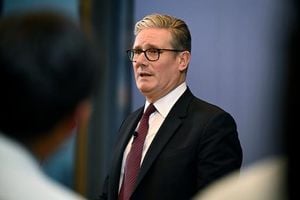Germany's gold reserves, totaling a staggering 3,351 tons, rank second in the world, trailing only behind the United States. A significant portion, specifically 1,236 tons valued at approximately 113 billion euros, is stored in the Federal Reserve Bank of New York, commonly referred to as the Fed. This accounts for over 36 percent of Germany's total gold holdings. Meanwhile, more than half of these reserves, 1,710 tons, are securely housed in Frankfurt am Main, with the remainder located at the Bank of London.
As of the end of 2021, the overall value of Germany's gold reserves was estimated at around 174 billion euros, a substantial figure when compared to the federal budget expenditures of approximately 498.6 billion euros for the same year. However, recent political developments have raised concerns about the safety and management of these reserves, especially since the advent of Donald Trump's presidency.
In light of Trump's controversial policies and his desire for greater control over the politically independent Fed, German politicians from the Christian Democratic Union (CDU) and the Christian Social Union (CSU) are increasingly vocal about the need to reassess the management of Germany's gold reserves. Former CDU Bundestag member Marco Wanderwitz has previously called for regular checks on the gold stored abroad, arguing that the situation warrants a fresh examination. He recently stated, "Of course, the question arises anew."
Similarly, Markus Ferber, a long-serving EU parliament member from the CSU, echoed these sentiments in an interview with the Bild newspaper. He emphasized the necessity of regular inspections of the German gold reserves, insisting that representatives from the Bundesbank should personally count the gold bars and document their findings.
Michael Jäger, president of the European Taxpayers Association, has taken a more urgent stance, demanding the immediate repatriation of Germany's gold from the United States. He expressed his concerns to Bild, saying, "We are not even allowed to control our own gold - that is an intolerable situation." Jäger's position highlights the anxiety surrounding Germany's financial security, especially amid discussions of significant new debt in Berlin and Brussels. He insists that immediate access to all gold reserves is essential during times of financial uncertainty.
Despite these growing concerns, the Bundesbank maintains a confident stance regarding the security of its gold holdings in the U.S. Bundesbank President Joachim Nagel stated in February that he has "full trust" in the Fed as a reliable partner for storing Germany's gold reserves, asserting, "I have no sleepless nights" over the situation. This assurance appears to remain steadfast, even amidst the political turbulence surrounding U.S. leadership.
The rationale behind the substantial amount of German gold stored in the U.S. can be traced back to historical trade patterns following World War II. Thorsten Polleit, the former chief economist of Degussa Goldhandel GmbH and a professor of economics at the University of Bayreuth, explained that Germany accumulated gold reserves in the U.S. due to trade surpluses. As Germany exported more to the U.S. than it imported, the excess was settled in gold, which was then transferred to the Deutsche Bundesbank's account at the Fed.
Polleit remains relatively untroubled by the current political climate, stating, "I am not so dramatically inclined" regarding the potential risks to Germany's gold under the Trump administration. Nonetheless, he acknowledges the importance of reviewing the situation, remarking that it is a "good and disciplining measure" to reassess the arrangement, as it is a responsibility owed to the German taxpayer.
It is worth noting that Germany has previously repatriated gold reserves, including the relocation of 374 tons from the Banque de France in Paris to Frankfurt in 2017. The Bundesbank justified this move by citing the Euro's commonality with France and the impracticality of trading in one of the international reserve currencies. Furthermore, Paris was not considered a major gold trading hub like London.
The Bundesbank conducts annual inventories of German gold bars both domestically and internationally, maintaining a detailed "gold bar list" that outlines each bar's inventory number, weight, and fineness. Regular checks are also performed at the three storage sites in Frankfurt, London, and New York. According to a fact check by the DPA news agency, there have been no complaints or issues raised during any audits conducted thus far.
As discussions around the management and security of Germany's gold reserves continue, the tension between political demands for control and the Bundesbank's assurances of safety will likely remain a focal point of debate. The call for transparency and accountability in the handling of these valuable assets reflects broader concerns about financial security in an increasingly uncertain global landscape.
In the face of political pressures and public scrutiny, the future of Germany's gold reserves hinges on balancing trust in international partners with the need for national security and financial independence. As the situation evolves, it will be interesting to see how the Bundesbank navigates these challenges while addressing the concerns raised by various political factions.





